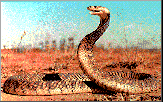




Herpetology is the study of reptiles and amphibians. Here are some various general definitions concerning herpetology.
If you really want to know more scientific stuff regarding herpetology, this will give you a list of journals on the subject.
If all you want is info on various herps and their natural habitats, somebody out there has actually taken the time to compile a list.
For the true herp freak out there, you can search at the California Academy of Sciences for specific information. Of course, you do have to know exactly what you are looking for.
So far, there seems to be only two Usenet groups that discuss herpetology. One is more serious than the other.

 Selected Pics
Selected Pics"A picture is worth a thousand words", so here are some herp shots for those of you who don't get out much.
But before we get to the good stuff, here's a ftp site for you to find your own pictures.
 Reptiles
ReptilesWebster's Dictionary defines reptiles as "any of a class (Retilia) of air-breathing vertebrates that include the alligators and crocodiles, lizards, snakes, turtles, and extinct related forms and are characterized by a completely ossified skeleton with a single occipital condyle, a distinct quadrate bone usually immovably articulated with the skull, ribs attached to the sternum, and a body usually covered with scales or bony plates".
 Amphibians
AmphibiansI've returned to the trusted Webster's for amphibians:"an amphibious organism; esp :any of a class (Amphibia) of cold-blooded vertebrates (as frogs, toads, or newts) intermediate in many characters between fishes and reptiles and having gilled aquatic larvae and air-breathing adults". Frogs seem to be the favorites of the general computer public.

 Want a New Pet?
Want a New Pet?Now we can get to really important stuff. What should one know before making that first purchase? What if you already have a pet herp, but it slithered away from you one day? How would you find a lost herp?
What if you just want care sheets on specific kinds of herps? Here's a handy list:
And here's a care sheet for my first choice for a herp pet:
If you do run out and buy a new herp to keep as a pet, here's a little something you should be aware of: They have more brain power than people give them credit for!!
Just remember this message from a pet iguana.


There are things besides herps in WWW. Here are some of my other veins of interest. Enjoy
 Contact Us
Contact UsIf you are an educator who is using our NEXTSTEP or virtual applications in the classroom, we would especially like to hear from you. Let us know what you are doing and how it is working out. Continued support for this project will depend on its impact in science education.
If you are an educator who is interested in making use of our NEXTSTEP or virtual applications, please let us know how we can help.
 Return to the Electronic Desktop Project home page
Return to the Electronic Desktop Project home page
![]() Check out the WWW Virtual Application Catalog from the EDP
Check out the WWW Virtual Application Catalog from the EDP
 Check out the NEXTSTEP Application Catalog from the EDP
Check out the NEXTSTEP Application Catalog from the EDP
 Visit the home page for California State University, Los Angeles
Visit the home page for California State University, Los Angeles